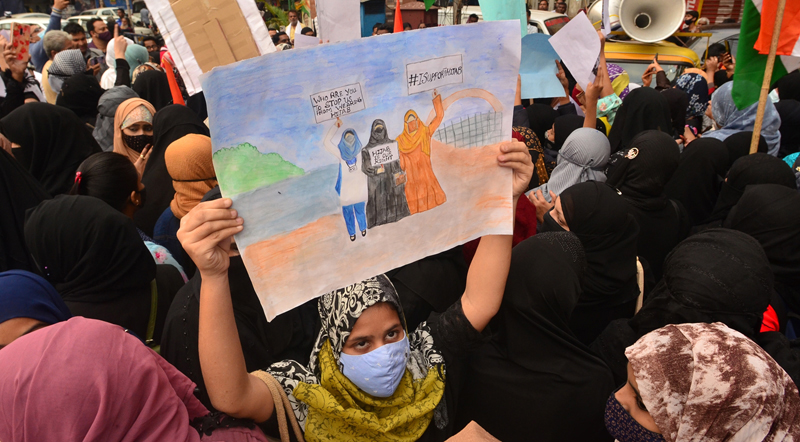 Hijab Ban
Hijab Ban Supreme Court to look into plea for interim order over Hijab ban in Karnataka's PUC colleges
New Delhi/UNI: A bench of the Supreme Court- headed by the Chief Justice of India (CJI) Dr Dhananjaya Yeshwant Chandrachud- on Monday said that it would look into the plea for giving an interim order related to Hijab ban in PUC colleges in Karnataka.
The CJI said this after hearing a mention by senior advocate Meenakshi Arora for setting up a three-judge bench in view of the split verdict.
"I would examine the matter for fixing a hearing in the matter," Justice Chandrachud said, after hearing Arora, who cited that there is an urgency in hearing the matter, keeping in view the examinations from Feb 6.
The senior advocate mentioned before the apex court for interim direction in the matter.
She told the top court that since the examinations are going to be conducted in the government institutions, those wearing hijab may not be able to take the exams.
To which, the CJI said he would examine the matter for fixing a hearing.
The SC said that it will examine the matter, as it has to be placed before a bench of 3 judges and asked to submit a short note to the registrar.
The Supreme Court's two-judge bench had on Oct 13, last year, delivered a split verdict in the Hijab ban case, and it had referred the matter now to the Chief Justice of India's (CJI) court for his direction to constitute a larger bench to decide the issue.
A full bench of the Karnataka High Court comprising then Chief Justice Ritu Raj Awasthi, Justice Krishna Dixit and Justice J M Khazi, in their judgement on March 15, 2022, held that wearing of hijab by women was not an essential religious practice of Islam.
The High Court of Karnataka's three-judge bench while pronouncing the Judgement dismissed the petitions filed by a group of muslim girl students against PU government college for denying them entry while wearing Hijab.
The High Court bench led by Chief Justice Rituraj Awasthi dismissed the petitions stating that the practice of hijab is not an essential practice under Islam and thus does not fall within the ambit of Article 25 of the Constitution of India.
The High court had also held that prescription of school uniform is only a reasonable restriction which is constitutionally permissible which the students cannot object to and stated that the government had the power to issue such notification and that no case was made out against the government notification.
Support Our Journalism
We cannot do without you.. your contribution supports unbiased journalism
IBNS is not driven by any ism- not wokeism, not racism, not skewed secularism, not hyper right-wing or left liberal ideals, nor by any hardline religious beliefs or hyper nationalism. We want to serve you good old objective news, as they are. We do not judge or preach. We let people decide for themselves. We only try to present factual and well-sourced news.







